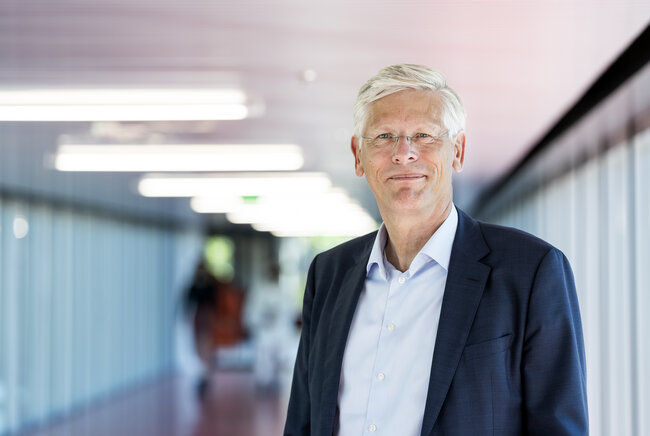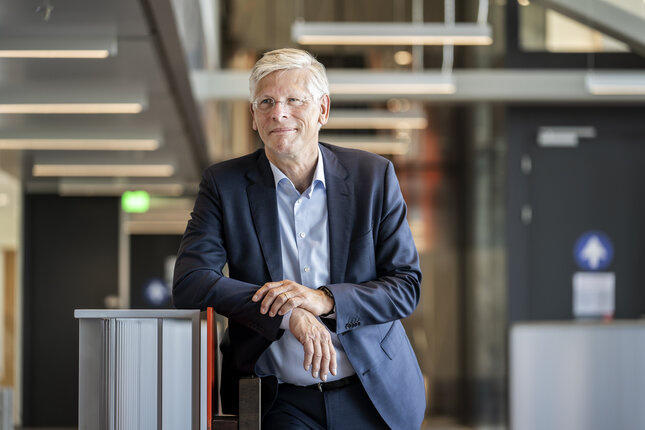“An academic is not a jack of all trades”
A new appraisal system for academics will look at more than just their research. For Rector Frank Baaijens, this change brings a welcome opportunity to promote team spirit and ‘academic citizenship’.

Academics feel the recognition they receive depends too heavily on their academic output. How many publications have your written, how often are you cited, how many grants have you secured? With the new appraisal system Recognition and Rewards this will change, says Rector Frank Baaijens. “We will bring more balance to the appraisal of academics, valuing them for their talents and ambitions in the fields of research, education, impact and leadership.”
Baaijens is very clear: excellence will continue to be the aim of our university's academic personnel. In education and research, as well as in additional areas. “As a university we have responsibilities in the fields of research, education and impact. With Recognition and Rewards we want to take a much broader view of our academic personnel. Find a way of valuing the contributions everyone makes. See the diversity in what people are capable of and recognize where their talents and ambitions lie.”
He goes on to emphasize that academics must be active in both research and education. “Many academics feel they are judged by just one thing, their research. This leads to other areas being perceived as being less important, even education, which is the university's core task. We want this given greater importance and we want to value people for their other activities within their department,” says Baaijens.
Academic citizenship
This brings him to 'academic citizenship'. “Together, you have a department and a university to run. You need people to be willing to join an examination committee, an appeals committee, an appointment advisory committee, and so on. An expression of value is also required for these activities.”
For Baaijens, Professor Jan van Hest exemplifies the kind of person his is looking for: the academic citizen. “An excellent academic, but he'll take on other tasks too. His teaching is outstanding - and he counts first-years among his students - and he has taken on administrative responsibility. But in the area of educational reform, for example, he isn't taking a leading role.” By which Baaijens means to say: you don't have to take on everything, but your focus must be broader than research alone.
“In a group you can develop an incredible strength that would never be possible as an individual”
Rector Frank Baaijens

“Not, of course, that you can expect everyone to be equally good at everything. But what you can do is make sure you have a team in which research, education and impact are covered. I believe in team spirit: in a group you can develop an incredible strength that would never be possible as an individual.”
A balanced assessment is the challenge
Baaijens realizes that the challenge lies first and foremost in how you assess excellence in research, education, impact and leadership. “Within research we have a long history of assessing on output, but now we need to place more emphasis on quality rather than being concerned solely with the number of publications. Likewise within education you want people to build a portfolio, so that at an international level they can show what they have conceived in terms of innovations and what impact this has had. So that, like research, this becomes an area in which they can earn a reputation.” By way of example, Baaijens mentions Rick de Lange, who was appointed to a professorship in part for his educational innovations.
Education
By what yardstick do you measure people who excel in education? “As things now stand, we have two profiles,” Baaijens explains. “Academics whose main thrust is research and who also teach. They excel at research but like everyone else stand before the class on a Monday morning and do a great job. We also have those people for whom education is a field in which they are developing as professionals, alongside their research. They are fully engaged in educational innovation and shine at it. For these academics too, career steps must be in place.”
Here, too, in order to be assessed, it is a question of finding the right way to show what you have done. This could take a mixed form involving a narrative: what is your vision, what have you achieved. Supplemented with demonstrable results, such as a teaching evaluation, an education prize, a publication about education, an appraisal by colleagues, international standing. “It's what we do in research,” says Baaijens. “Why not do the same in education? Challenge-based learning would be just the topic for a fabulous piece of education-related research.”
Leadership and team
Some form of leadership will be expected of everyone. “If you are an inexperienced assistant professor, you aren't going to be asked to contribute policy ideas, but you do supervise students,” explains Baaijens. The form of leadership a person exhibits will change as their career progresses. And no single leadership style is the best; here too, diversity is preferable.
The first, and sometimes the only question asked in job interviews is still ‘What kind of research do you want to do?’ Baaijens wants to see this change. “When we're appointing a professor, we still look chiefly at academic output and assume that someone of this caliber has leadership qualities. We must also ask them about their vision of education and impact, how they deal with diversity, how they ensure that people get the best out of themselves, how they create a safe work environment. You can be incredibly good at your research, but if you intimidate your colleagues and excuse yourself from departmental tasks, do you deserve to become a professor? We have to find the right elements for the advisory committees to work with going forward.”
Recognition and Rewards requires academics to write a statement about their supervisory or leadership qualities, as part of the narrative section of their résumé. How collegial are you, how do you supervise students and doctoral candidates, how do you pay attention to team spirit, how do you give and receive feedback?
A balanced and diverse team is an important asset. “You are aiming to make better use of each other's talents so that as a group you make headway. If an academic is good at academic communication, you could see that as a core competence. The same applies to someone who is passionate about educational innovation. Provided it fits within the team, this could be a field where they develop professionally. This offers more flexibility than saying ‘We value you only for your research qualities’. This is what we are trying to do with Recognition and Rewards. Value people more broadly.”
Impact and open science
How do you decide what the impact of an individual's work is? Baaijens: “In terms of research impact, this includes any and all activities that generate impact. In other words, it is broader than the number of publications or citations. It would include, say, the patents someone has accumulated, or a business venture someone has started. Or new guidelines someone has developed that have been adopted by, say, RIVM, or getting yourself hired by a company alongside your university work. We need to get some experience of deciding what we find important and what not. To do this, we'll use peer review. Colleagues in the field must assess whether what people are doing is special; this is not something you can always prescribe.”
The value of open science is something else to be considered. “It is difficult to justify the disappearance behind a paywall of research funded by society. The validation of research and the speed with which research evolves both depend crucially on data being made available. The importance of this has been underscored yet again by the present COVID-19 pandemic. “There are also researchers who have collected incredibly interesting data for research purposes, for example, neatly ordered it and made it publicly available. This isn't a publication but if so many people can use it, it becomes a significant contribution to research. This is something else to be valued.”
Where are we now?
Baaijens has helped to draw up the plan behind Recognition and Rewards, published by the universities' federation VSNU. At the end of 2019 its precursor appeared Room for everyone’s talent, which has been embraced by all the Dutch universities and research institutes. The universities have the flexibility to introduce the plan as they see fit and to roll it out at their own pace. In the spring of this year, the TU/e Recognition and Rewards task force held six sessions with some hundred and fifty academics in order to hear what they think of it. In addition, in the run-up to summer six enrichment sessions were held with three interdepartmental committees (IFC) - Engineering; Basic Sciences and Humans; Technology, Management and Design.
“We have formulated six principles and after the summer we'll continue to discuss them with the interdepartmental committees. After that, I hope we'll have a package about which they can say ‘we can use this to evaluate and value people better.’”
The six leading principles of Recognition and Rewards at TU/e
1: As well as excellence in education and research, academics will also be encouraged to develop core competences in line with their talents. These would be such skills as entrepreneurship, science communication and leadership.
2: Diverse and dynamic career paths driven by an academic's core competences are to be encouraged.
3: When assessing academics, the focus will be on valuing quality over quantity.
4: The right balance between the individual and the collective (team) is to be achieved.
5: Open science as a way of sharing research within society is to be encouraged.
6: Academic leadership, with a focus on inclusivity, talent development and a safe work environment, is to be encouraged.

The discussions with the IFCs are essential to the introduction of Recognition and Rewards, Baaijens is keen to stress. “These committees include people in the departments where the system is going to be used. This is why as far as possible we need to develop a shared vision and implementation with these committees. If you've got academics sitting on these advisory committees who only value the number of publications, you won't get anywhere. If they too are convinced that this is the right path to take, we can work with them to take the steps towards implementation. Only then will change happen.”
It would be nice if we started having other kinds of discussion with our academics
Rector Frank Baaijens
An important point that Baaijens took away from the various sessions on Recognition and Rewards is this: more is involved here than the promotion of academics. “Not everyone can reach the same work grade, nor do they want to. It is very important that we recognize and value each person's contribution. Together, we are and we make the university.”
This appreciation should also be voiced, as Baaijens has himself learned over the years. “In science there are a great many moments of appreciation: when a student graduates, a researcher gains their doctorate, a publication is accepted, when a grant is secured. Each and every one of these is a moment when external appreciation for your work comes your way. Personally, I am always busy thinking ahead, What’s next? Within my group at Biomedical Engineering it's occasionally been said to me that it's good to celebrate your success before you move on. And don't forget to congratulate others. It doesn't matter how much a person enjoys their work, if they are never appreciated, if only in the form of a compliment, eventually it starts to niggle.”
More on our strategy



